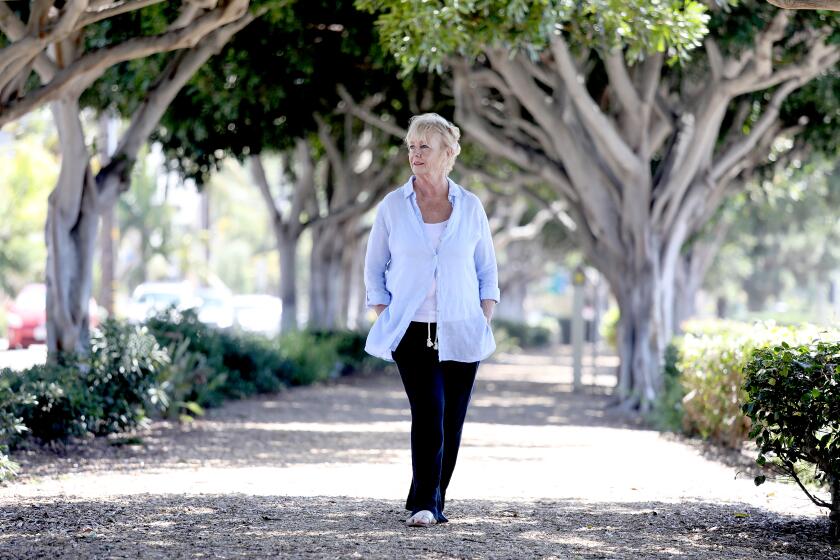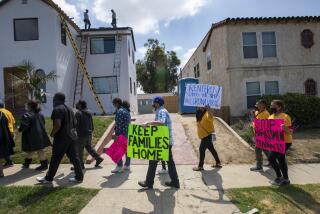L.A. County is launching CARE Court. Here’s what to expect

- Share via
Gov. Gavin Newsom’s mental health program known as CARE Court arrives in Los Angeles County on Friday, with officials expressing optimism that it will help with the homelessness crisis.
“We know that there are too many people with severe mental illness who are living on the streets,” Board of Supervisors Chair Janice Hahn said at a Thursday news conference. “We’ve all seen them, and so far, we’ve been unable to reach them or give them the care that they need. ... That’s why what we’re doing here today is so important.”
The L.A. County Department of Mental Health, first responders, family members, roommates or spouses will be able to petition the court to start the process of enrolling someone into the state-funded program.
Those petitioned can attend their private CARE Court proceedings either virtually, in person at the Norwalk courthouse or at one of 12 county courthouses with free private spaces for people involved in hearings.
Signed into law by Newsom in 2022, the CARE Act requires every county in California to open the specialized courts that offer voluntary treatment and services. This differs from assisted outpatient treatment, a more restrictive form of court-involved treatment.
Officials estimate that 4,500 people in L.A. County could be enrolled in CARE Court in the first year.
Seven counties — San Diego, Orange, Glenn, Riverside, Stanislaus, Tuolumne and San Francisco — were the first to implement the CARE Act. Their courts opened on Oct. 1, and two months in, provide a glimpse of what L.A. County might expect.
Rural counties have seen less interest than urban counties. Glenn County, north of Sacramento in the Sacramento Valley, has not received any petitions, according to behavioral health director Joe Hallett.
CARE courts open in several California counties Oct. 2. Some families and others question the voluntary-compliance aspect of the mental illness law.
Nine petitions have been filed in Stanislaus County, and one has been approved, said county Supervisor Terry Withrow, who described some of the challenges getting people into a CARE plan. Notable is the lack of documentation; petitioners must provide proof of a psychiatric hospitalization.
In Southern California, the legislation is starting to have a more conspicuous effect.
The CARE Court in Orange County has received 35 petitions. Fourteen met the CARE Act criteria and have advanced to the Department of Public Health. Of those 14, one was dismissed, and for eight others, the 14-day deadline was extended so the individual could be located.
“The remaining difference is in flux,” said Veronica Kelley, behavioral health director for Orange County. “The judge might have received partial paperwork or wanted to give the petitioner more time.”
Twenty petitions have been filed in Riverside County, according to a spokesperson, with dozens of inquiries —- for those who did not meet criteria — referred to behavioral health services for follow-up.
San Diego County’s CARE Court has received 42 petitions. Two were dismissed by the judge, and the rest were sent to Behavioral Health Services, which dismissed six others. Thirty-four are active, said Luke Bergmann, the county’s behavioral health director.
When asked about the rollout of the CARE Act during a news conference on Monday, Newsom described the program as a “pilot effort” so far and expressed confidence that the original estimate — between 7,000 and 12,000 people brought into the program — would be realized “in a matter of years.”
“I’m excited about what it promotes and promises,” he said.
Los Angeles County is poised to join the first wave of counties to launch a sweeping new mental health plan pushed by Gov. Gavin Newsom.
L.A. County was originally slated to open its CARE Court in 2024.
At Thursday’s news conference, Hahn said the county moved up its launch in part because she and Los Angeles Mayor Karen Bass worked together to model a different behavior in the local politics, “not pointing fingers, not assigning blame, particularly for the homelessness crisis.”
Historically, the city and county have had a complex, at times cantankerous, relationship around who should be funding services and who is in charge of which aspects of addressing the thousands of people sleeping outside each night in L.A. County.
Hahn said the voters have given the city and county billions of dollars to build housing and shelters, practice street medicine and finance outreach teams to get people into mental health care.
“But the status quo just wasn’t working for everybody,” Hahn said. “And we felt so strongly that CARE Court was that missing piece of the puzzle.”
To qualify for CARE Court, a person must be at least 18 and have schizophrenia or another psychotic disorder. Those with bipolar disorder, regardless of whether they have psychotic symptoms, do not qualify under current law.
Generally, a participant’s illness must be keeping them from carrying out day-to-day tasks. They can’t already be receiving treatment in a voluntary treatment program. They must be getting sicker and in danger of not surviving without supervision, or need supervision to better ensure they won’t grow sicker.
CARE Court has to be the least restrictive option for them — meaning the court would find that the person wouldn’t succeed by simply being enrolled at a county outpatient mental health clinic to regularly see a therapist. And the court must find that CARE Court would benefit the person.
Civil rights advocates have long expressed concerns that CARE Court will lead to more people being forced into involuntary treatment, and that the effort is overall a misguided way to help people.
Jason Robison, chief program officer of SHARE!, a nonprofit mental health and housing provider, said Thursday that research has shown for decades that people with serious mental illnesses and substance use disorders must receive social support and social relationships — like those found in self-help groups — to recover.
Los Angeles County is poised to join the first wave of counties to launch a sweeping new mental health plan pushed by Gov. Gavin Newsom.
“That’s the thing that our system of mental health services is really not good at, and it’s the thing that CARE Court is not addressing,” Robison said. “Because [CARE Court] is focusing on making sure somebody is going to be compliant with medication and is going to see a treatment team.”
CARE Court places the accountability to succeed on the person being petitioned to court, not on the service providers who too often try to force compliance and control, rather than slowing down and addressing the needs of the person, he said.
Every CARE Court participant in L.A. County will be represented by the Independent Defense Counsel’s Office, housed in the L.A. County Public Defender’s office but independently operated.
Marco Saenz, who leads the team of 50 CARE Court attorneys, said that in addition to protecting the civil liberties of the individual in CARE Court, the attorneys will also be charged with doing what’s in the best clinical interest of the client.
That also means ensuring that if the client does not want to participate, they aren’t forced to.
“In this system, the attorney is there to make sure the [looming punishment] isn’t created, that the system remains voluntary, that the threat of involuntary medication, involuntary institutionalization, those very real concerns that are rational for people to have, that there’s some sort of safeguard,” said L.A. County Public Defender Ricardo Garcia.
Times staff writer Hannah Wiley contributed to this report.
- Share via
Watch L.A. Times Today at 7 p.m. on Spectrum News 1 on Channel 1 or live stream on the Spectrum News App. Palos Verdes Peninsula and Orange County viewers can watch on Cox Systems on channel 99.
More to Read
Sign up for Essential California
The most important California stories and recommendations in your inbox every morning.
You may occasionally receive promotional content from the Los Angeles Times.


















